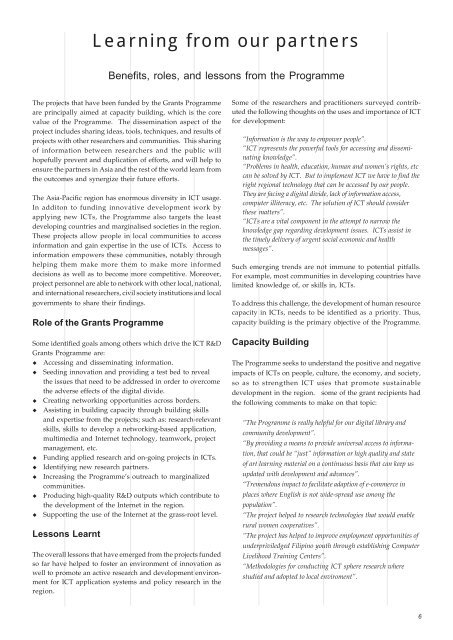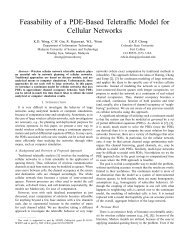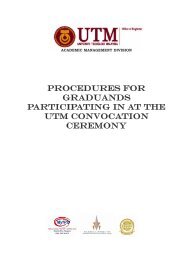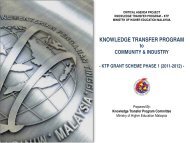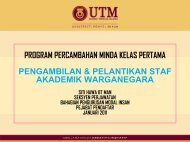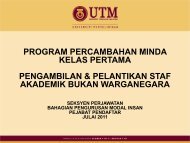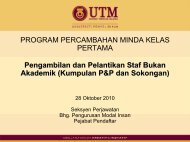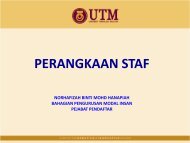PAN ASIA ICT R&D Grants Programme - UTM
PAN ASIA ICT R&D Grants Programme - UTM
PAN ASIA ICT R&D Grants Programme - UTM
- TAGS
- grants
- programme
- web.utm.my
Create successful ePaper yourself
Turn your PDF publications into a flip-book with our unique Google optimized e-Paper software.
The projects that have been funded by the <strong>Grants</strong> <strong>Programme</strong><br />
are principally aimed at capacity building, which is the core<br />
value of the <strong>Programme</strong>. The dissemination aspect of the<br />
project includes sharing ideas, tools, techniques, and results of<br />
projects with other researchers and communities. This sharing<br />
of information between researchers and the public will<br />
hopefully prevent and duplication of efforts, and will help to<br />
ensure the partners in Asia and the rest of the world learn from<br />
the outcomes and synergize their future efforts.<br />
The Asia-Pacific region has enormous diversity in <strong>ICT</strong> usage.<br />
In additon to funding innovative development work by<br />
applying new <strong>ICT</strong>s, the <strong>Programme</strong> also targets the least<br />
developing countries and marginalised societies in the region.<br />
These projects allow people in local communities to access<br />
information and gain expertise in the use of <strong>ICT</strong>s. Access to<br />
information empowers these communities, notably through<br />
helping them make more them to make more informed<br />
decisions as well as to become more competitive. Moreover,<br />
project personnel are able to network with other local, national,<br />
and international researchers, civil society institutions and local<br />
governments to share their findings.<br />
Role of the <strong>Grants</strong> <strong>Programme</strong><br />
Some identified goals among others which drive the <strong>ICT</strong> R&D<br />
<strong>Grants</strong> <strong>Programme</strong> are:<br />
� Accessing and disseminating information.<br />
� Seeding innovation and providing a test bed to reveal<br />
the issues that need to be addressed in order to overcome<br />
the adverse effects of the digital divide.<br />
� Creating networking opportunities across borders.<br />
� Assisting in building capacity through building skills<br />
and expertise from the projects; such as: research-relevant<br />
skills, skills to develop a networking-based application,<br />
multimedia and Internet technology, teamwork, project<br />
management, etc.<br />
� Funding applied research and on-going projects in <strong>ICT</strong>s.<br />
� Identifying new research partners.<br />
� Increasing the <strong>Programme</strong>’s outreach to marginalized<br />
communities.<br />
� Producing high-quality R&D outputs which contribute to<br />
the development of the Internet in the region.<br />
� Supporting the use of the Internet at the grass-root level.<br />
Lessons Learnt<br />
Learning from our partners<br />
Benefits, roles, and lessons from the <strong>Programme</strong><br />
The overall lessons that have emerged from the projects funded<br />
so far have helped to foster an environment of innovation as<br />
well to promote an active research and development environment<br />
for <strong>ICT</strong> application systems and policy research in the<br />
region.<br />
Some of the researchers and practitioners surveyed contributed<br />
the following thoughts on the uses and importance of <strong>ICT</strong><br />
for development:<br />
“Information is the way to empower people”.<br />
“<strong>ICT</strong> represents the powerful tools for accessing and disseminating<br />
knowledge”.<br />
“Problems in health, education, human and women’s rights, etc<br />
can be solved by <strong>ICT</strong>. But to implement <strong>ICT</strong> we have to find the<br />
right regional technology that can be accessed by our people.<br />
They are facing a digital divide, lack of information access,<br />
computer illiteracy, etc. The solution of <strong>ICT</strong> should consider<br />
these matters”.<br />
“<strong>ICT</strong>s are a vital component in the attempt to narrow the<br />
knowledge gap regarding development issues. <strong>ICT</strong>s assist in<br />
the timely delivery of urgent social economic and health<br />
messages”.<br />
Such emerging trends are not immune to potential pitfalls.<br />
For example, most communities in developing countries have<br />
limited knowledge of, or skills in, <strong>ICT</strong>s.<br />
To address this challenge, the development of human resource<br />
capacity in <strong>ICT</strong>s, needs to be identified as a priority. Thus,<br />
capacity building is the primary objective of the <strong>Programme</strong>.<br />
Capacity Building<br />
The <strong>Programme</strong> seeks to understand the positive and negative<br />
impacts of <strong>ICT</strong>s on people, culture, the economy, and society,<br />
so as to strengthen <strong>ICT</strong> uses that promote sustainable<br />
development in the region. some of the grant recipients had<br />
the following comments to make on that topic:<br />
“The <strong>Programme</strong> is really helpful for our digital library and<br />
community development”.<br />
“By providing a means to provide universal access to information,<br />
that could be “just” information or high quality and state<br />
of art learning material on a continuous basis that can keep us<br />
updated with development and advances”.<br />
“Tremendous impact to facilitate adaption of e-commerce in<br />
places where English is not wide-spread use among the<br />
population”.<br />
“The project helped to research technologies that would enable<br />
rural women cooperatives”.<br />
“The project has helped to improve employment opportunities of<br />
underpriviledged Filipino youth through establishing Computer<br />
Livelihood Training Centers”.<br />
“Methodologies for conducting <strong>ICT</strong> sphere research where<br />
studied and adopted to local enviroment”.<br />
6


